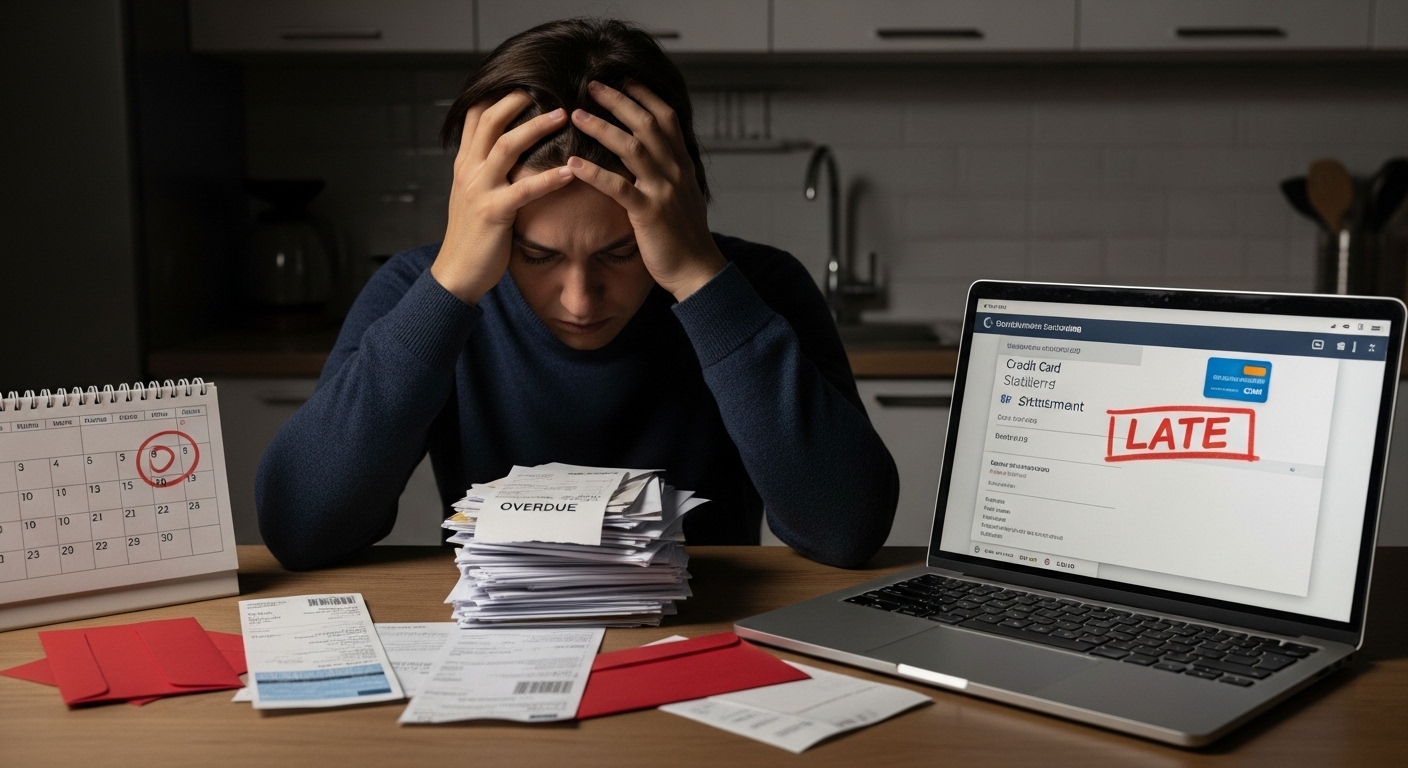What Happens If You’re Late on Your Credit Card Payment?

Missing a credit card payment deadline can feel like a minor oversight, but the consequences can ripple through your financial life in ways you might not expect. Whether you forgot the due date, faced unexpected expenses, or simply couldn’t make the payment, understanding what happens when you’re late can help you navigate the situation and minimize the damage.
The Immediate Consequences
Late Fees Hit First
The most immediate consequence of a late credit card payment is a late fee. In the United States, credit card issuers can charge up to $32 for a first late payment and up to $43 for subsequent violations within six billing cycles. These fees add to your existing balance, compounding your debt problem.
Some credit card companies offer a grace period of one or two days beyond the due date, but don’t count on it. The safest approach is to ensure your payment arrives on or before the due date listed on your statement.
Your Interest Rate May Skyrocket
If you’re more than 60 days late on your payment, your credit card company can invoke what’s known as a “penalty APR.” This can push your interest rate as high as 29.99% or more, applying not just to new purchases but potentially to your existing balance as well.
This penalty rate can remain in effect for at least six months, and some issuers may keep it indefinitely until you demonstrate consistent on-time payment behavior. The difference is significant: on a $5,000 balance, the additional interest from a penalty APR could cost you hundreds of dollars extra per year.
The Credit Score Impact
How Late Payments Appear on Your Credit Report
Here’s where things get serious for your long-term financial health. Payment history accounts for approximately 35% of your FICO credit score, making it the single most important factor in determining your creditworthiness.
Credit card companies typically report late payments to the three major credit bureaus (Equifax, Experian, and TransUnion) once you’re 30 days past due. The reporting follows this timeline:
- 30 days late: First reported delinquency
- 60 days late: More severe negative mark
- 90 days late: Significant credit damage
- 120+ days late: Account may be charged off and sent to collections
Each level of lateness causes progressively more damage to your credit score. A single 30-day late payment can drop a good credit score by 60 to 110 points, while a 90-day late payment can be even more devastating.
How Long It Stays on Your Record
Late payments remain on your credit report for seven years from the original delinquency date. However, their impact on your score diminishes over time, especially if you establish a pattern of on-time payments going forward. The most recent payment history weighs more heavily in scoring algorithms than older information.
The Cascade Effect on Your Financial Life
Other Creditors May React
Credit card companies regularly review their customers’ credit reports through a practice called “account review.” If one creditor sees that you’ve been late with another company, they might:
- Reduce your credit limit
- Increase your interest rate (through “universal default” clauses, where permitted)
- Close your account entirely
- Deny you for new credit products
This means a late payment on one card can trigger negative actions across all your credit accounts, creating a domino effect that’s difficult to reverse.
Beyond Credit Cards
The damage doesn’t stop with credit cards. Your credit score affects:
- Mortgage rates: A lower score can cost you tens of thousands of dollars over the life of a home loan
- Auto loans: Higher interest rates mean larger monthly payments
- Apartment rentals: Many landlords check credit scores before approving applications
- Employment: Some employers review credit reports during the hiring process
- Insurance premiums: In many states, insurers use credit-based insurance scores to set rates
- Utility deposits: You may need to pay deposits for electricity, gas, or phone service
What to Do If You Miss a Payment
Act Immediately
If you realize you’ve missed a payment, don’t wait. Pay as soon as possible, even if you can only afford the minimum payment. Every day that passes increases the likelihood of reporting and additional fees.
Contact Your Credit Card Company
Call your credit card issuer’s customer service line immediately. If this is your first late payment and you have a history of on-time payments, they may:
- Waive the late fee as a courtesy
- Agree not to report the late payment to credit bureaus
- Work with you on a payment plan
Be polite but direct. Explain your situation honestly and ask specifically for these accommodations. Many people don’t realize that credit card companies have some discretion in these matters, especially for valued customers.
Consider These Options
If you’re struggling to make payments, several options might help:
- Balance transfer: Move your balance to a card with a 0% promotional APR, giving you breathing room to pay down debt without accumulating interest
- Debt consolidation loan: Combine multiple debts into a single loan with a lower interest rate
- Credit counseling: Non-profit credit counseling agencies can help you create a debt management plan
- Hardship programs: Many issuers offer temporary hardship programs that reduce payments or interest rates during difficult times
Prevention Strategies
Set Up Automatic Payments
The simplest way to avoid late payments is to automate them. Set up automatic payments for at least the minimum amount due. You can always pay more manually, but the automatic payment ensures you’ll never be late.
Create Payment Reminders
If you prefer not to automate, set up multiple reminders:
- Calendar alerts on your phone 7 days before the due date
- Another reminder 3 days before
- A final alert on the due date itself
Organize Your Due Dates
If you have multiple credit cards, consider requesting due date changes so all your payments fall around the same time of month, preferably shortly after you receive your paycheck. Most credit card companies will accommodate reasonable requests for due date changes.
Build an Emergency Fund
Even a small emergency fund of $500-$1,000 can prevent late payments when unexpected expenses arise. This buffer gives you the flexibility to handle financial emergencies without sacrificing your regular bill payments.
Understanding Your Rights
The Credit CARD Act Protections
The Credit Card Accountability Responsibility and Disclosure (CARD) Act of 2009 provides several protections:
- Credit card companies must mail statements at least 21 days before the payment due date
- Payments due on weekends or holidays are not considered late if received the next business day
- Payments must be credited on the day they’re received if submitted before 5 PM
- Late fees are capped at specific amounts
Dispute Inaccurate Reporting
If you believe a late payment was reported incorrectly, you have the right to dispute it with the credit bureaus. Submit a dispute letter explaining why the information is inaccurate and provide supporting documentation. The bureau must investigate within 30 days.
The Long-Term Perspective
While a late payment is serious, it’s not the end of your financial life. Credit scores are designed to reflect your current creditworthiness, with recent behavior weighted more heavily than past mistakes. If you:
- Resume making on-time payments immediately
- Keep your credit utilization low
- Avoid applying for new credit unnecessarily
- Maintain old accounts in good standing
Your credit score will gradually recover. Most people see significant improvement within 12-24 months of establishing consistent positive payment behavior.
The Bottom Line
A late credit card payment triggers a cascade of consequences: immediate late fees, potential interest rate increases, credit score damage, and broader impacts on your financial opportunities. The severity increases the longer the payment remains outstanding, with the most serious damage occurring once the late payment is reported to credit bureaus at the 30-day mark.
The best strategy is prevention through automation, reminders, and careful financial planning. If you do miss a payment, swift action and honest communication with your creditor can sometimes mitigate the damage. Remember that credit card companies would rather work with you than lose you as a customer or send your account to collections.
Your credit health is a long-term journey, not a single destination. One late payment doesn’t define your financial future, but how you respond to it and what you learn from the experience certainly shapes it. Take control, stay informed, and make your credit work for you rather than against you.
